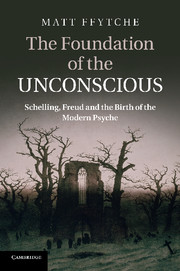Introduction: the historiography of the unconscious
Published online by Cambridge University Press: 05 December 2011
Summary
We want to make the I into the object of this investigation, our most personal I. But can one do that?
The historiography of psychoanalysis needs radical revision. This book poses the question: where does psychoanalysis begin? Which is to ask both when can we begin with it historically, and how exactly does it emerge? The conventional answer to those questions has, for many decades, been the one provided by Freud himself: that it begins in Vienna, out of a combination of Freud’s private clinical work with neurotics, his collaboration with Josef Breuer in the treatment of hysteria, and the period of depression which inaugurates his own self-analysis in the 1890s, all of which fed into the genesis of the Interpretation of Dreams – the work which for many marks the opening of the ‘Freudian’ century. More recent scholarship has greatly extended our knowledge of Freud’s formative contexts, including the publication of his correspondence with Wilhelm Fliess, and studies of the intellectual ambience of the Viennese medical school and Freud’s earliest work on neuro-anatomy, as well as the crucial impact of his period of study with Charcot in Paris. Psychoanalysis, evidently, has broader roots than Freud’s own self-investigation. Two reassessments, George Makari’s Revolution in Mind and Eli Zaretsky’s Secrets of the Soul, both draw on such revisions in psychoanalytic scholarship and shift the focus of study away from Freud’s own biography and towards colleagues, collaborators and the broader cultural climate. Even so, there remains a seemingly unshaken consensus that psychoanalysis is born out of the melting pot of late nineteenth-century Viennese modernity. According to Zaretsky, ‘we have still not historicized psychoanalysis’, but he takes this to mean exploring the breadth of its appeal and its contradictory impact on twentieth-century culture. Carl Schorske’s Fin-de-Siècle Vienna is, for Zaretsky, still the greatest attempt to ‘grasp psychoanalysis historically’. Equally, for Makari, what is needed is a lateral broadening of the frame of inquiry in order to identify the many different fields from which Freud ‘pulled together new ideas and evidence… to fashion a new discipline’. None of these works, with the exception of Sonu Shamdasani’s ground-breaking reassessment of the work of C. G. Jung, pay any attention to the longer-range history of the ‘unconscious psyche’, or tie Freud’s work back into the earlier nineteenth century’s fascination with the obscure tiers, functions and forces at work below the level of consciousness, the secret histories of the self. It is as if these notions emerge wholly unannounced in the 1890s.
- Type
- Chapter
- Information
- The Foundation of the UnconsciousSchelling, Freud and the Birth of the Modern Psyche, pp. 1 - 34Publisher: Cambridge University PressPrint publication year: 2011



